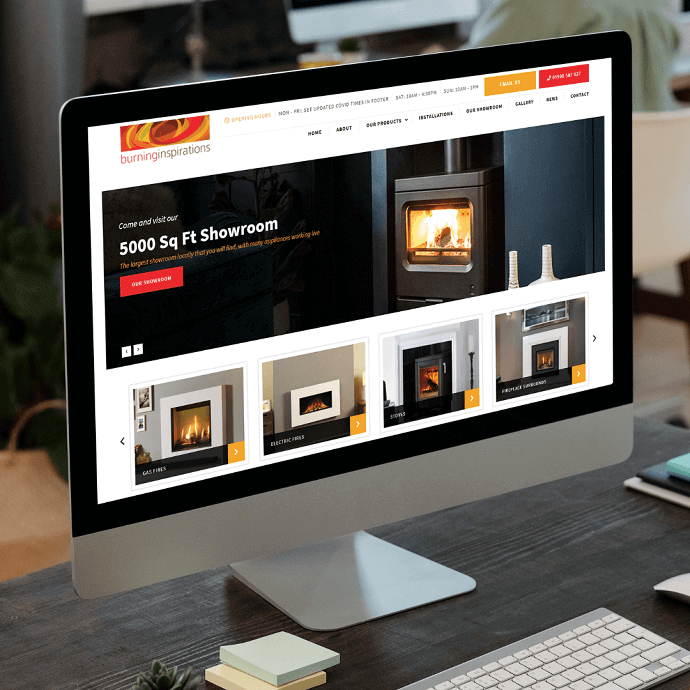Mel is our Partner Strategy & Delivery Manager and also a CIM Chartered Marketer, a testament to her commitment to excellence in the field. But Mel’s contributions don’t stop at the office door. Beyond her professional endeavours, she leads an active life as a qualified run leader and dedicated volunteer. Her experience in these roles has streamlined her leadership and teamwork skills, making her an invaluable asset when it comes to collaborating on projects and ensuring their success. Her sharp insights, strategic thinking, and knowledge have made her a backbone in our team’s ability to drive results for clients in this industry. Mel will make sure that we can approach marketing challenges from all angles and deliver outstanding results for our clients.
Posted on 24/10/2023 by Melanie Comerford
Budgeting For A New Website
A question we commonly face as a digital marketing agency is – “how much does a new website cost?”. Well, that’s essentially down to what type of website your business needs, here are some examples:
- Small 10 page brochure websites – start from £1,595
- Medium to large websites – £5,000 to £15,000
- eCommerce business website – £3,000 to £20,000
- Large scale data websites – £30,000 to £75,000
Many of the enquiries we receive substantially underestimate the costs involved with web design. It’s worth noting that this isn’t a bad thing, with so many different tools, apps, businesses, all claiming to offer web design at disparate prices it can quickly become confusing.
To mitigate this and to try and provide some transparency into the industry, we’ve put together a further breakdown of the costs you should expect to see in your web design project. Whilst these might not all be applicable to you, it’s always good to keep in mind the bigger picture.
Why Effective Web Design is Crucial
First things first though, why is effective web design so important? For starters, it takes around 50 milliseconds for users to form an opinion about your business based upon your website. In addition to this, 57% of internet users say they wont recommend a business with a poorly designed website on mobile.
Ultimately, consumer behaviour has changed and will continue to change over time. We must evolve with it. Modern consumers expect websites to be readily available at their fingertips when they need them. Many prospects believe that the quality of your website directly correlates to the quality of your business. Your website will ultimately have the power to make or break your ability to close new business.
You need to provide a secure, accessible and engaging experience to win over your visitors or risk losing them to a competitor.
Your website is the online stamp for your brand, and to succeed, you need to stand out. Your website should be the place where you can attract, engage and convert your visitors into leads, translating into real, tangible results for your business.
Today, your website is likely to play a huge role in your overall marketing strategy, building your authority and visibility online. Fail to get this right and your customers may go elsewhere! More often than not, these visitors will be landing on your website for the first time, making it that much more crucial to make a good and lasting impression.
Search engines play a huge role in delivering visitors to your website, so expect SEO to be a key element you need to focus on too. If your website isn’t developed with search engines in mind, you’ll have a huge challenge getting your website to rank, but that’s a topic for another blog.
How Much Does A Website Normally Cost?
So we’ve established why it’s crucial to have an effective website in today’s modern market, but how much can you expect one to cost? Now, here’s the tricky bit, the cost of websites vary so significantly, there isn’t a one-size-fits-all. So many different elements can change the overall cost and running costs of your site, whether it be down to functionality or technical design that can extend build time.
Below we’ve outlined a top-level breakdown of the average costs for a small, medium, large and eCommerce website.
Proprietary VS Open-Source Websites
Before going into the pricing breakdown, it’s crucial that you understand the differences between proprietary and open-source websites. Choosing the right website platform for your business is a huge decision. In order to achieve your business goals, you’ll need to ensure your platform has the capabilities to remain up-to-date, optimised for search and easy to use.

Open Source Systems
Open-source systems are generally built and maintained by expert web developers. By leveraging different coding languages, open-source websites can be customised, providing the most unique experiences for your visitors.
At Loop Digital, we utilise open source systems to ensure the websites we craft are bespoke. In addition to this, open-source enables us to hand over your website should you wish to move on, your website will be yours to do as you wish.
Proprietary Systems
Websites that use proprietary systems are often owned and managed by a single company. Typically, businesses like yours will not have access to the source code, restricting the number of customisations you can make. One of the key issues of proprietary systems is that you must be comfortable with the partnered business behind them. This business will likely have ownership over your website which means, you won’t be able to take your website elsewhere.
Not always, but most proprietary website providers will leverage a suite of templates or modules to use across an array of different sites. Meaning your website could end up looking a lot like others in your industry. Any future enhancements or customisations are likely to be very expensive or simply not possible.
Small Brochure Websites
The entry-level, starter website. Think of a brochure website as a digital version of a printed brochure, their goal is to showcase the products or services that your business provides. Not to be confused with a small-scale eCommerce website, brochure websites do not allow businesses to trade online. This type of website enables brands to display their goods in the hopes that customers will reach out via an enquiry, phone or by booking the service.
Unlike larger websites, these sites are normally constructed of only a handful of key pages. The focus of these pages is to communicate crucial information to prospects. Although described as simple, these websites can enable brands to build their online presence, and when paired with SEO, enhance their visibility in search engine results pages.
A brochure website is normally broken down into the following sections:
- Homepage
- About Us
- Our Services/Products
- Contact/Enquiry Page
A well-made brochure website is great for promoting your business. Using clear and concise descriptions, captivating images, they can draw people in and showcase your unique selling points to potential customers.

How much is a small website?
Looking exclusively at professional agencies, like ours, you can expect the smallest of websites to start from around £3,000, increasing for additional pages and functionality that utilise a number of different layouts.
Medium-to-Large Websites
Introducing probably the most popular products on the market, medium to large-sized websites, commonly consisting of anything from 10-50 pages. Obviously, the number of pages your business requires will impact the overall cost of building your website.
Mostly leveraged as commercial websites created using CMS platforms like WordPress or Magento. These bespoke builds enable brands to utilise custom design layouts, imagery and functionality often implemented by technical web developers. Medium to large-sized websites are perfect for businesses that offer a broad range of products or services, offering the space required to properly present and explain those services.
These websites commonly include the following pages:
- Services or Service Categories (usually 6+)
- About Us
- Case Studies & Testimonials
- News and/or blog
- Industry or niche-specific pages

How much is a medium to large-sized website?
Medium to large-sized websites can vary in costs due to the varying number of pages required. As a ballpark figure, you can expect a medium-sized website to start around £5,000 up to £15,000 for an extensive number of additional pages or designs.
Large Database-Driven Websites
Moving onto big business. Your average large-scale website can range between 50-200 different web pages. Sometimes referred to as a Database Driven Website, these dynamic websites grab information from a database or server to populate large-scale sites. Database driven websites alleviate the pressures of navigating your way through complex backend systems.
As a website manager or business professional, time can often be a restricted resource. With data-driven websites, users are no longer required to make manual changes or edits to web pages that can be found in your inventory, spreadsheets or other locations. Additional functionality enables business’s to sync their website to databases so that it always reflects the most up-to-date information.

How much is a Database-Driven Website?
According to the UK average costs, you can expect a large-scale database-driven website to cost between £30,000 to £75,000. Available at a substantially higher cost, this premium website is often the best option for large or global corporations. They require a full technical specification to be pulled together to ensure full requirements are met.
eCommerce Websites
An eCommerce website is a platform on which businesses can build their online store and carry out transactions anywhere and at any time. eCommerce continues to be a fast-growth area of business with the potential to reach much larger audiences than any physical shop. These websites are often broken down into three key parts, a storefront, a showcase of products and checkout.
eCommerce websites should make it as easy as possible for your users to browse and securely purchase their goods. Streamlining the user experience with easy navigation, clear calls-to-action and a safe transactional process for your customer.
To maximise the efficiency and performance of your eCommerce website, you’ll need to implement an SEO strategy, this will ensure your products can be found in organic search. SEO is a crucial part of securing success for your eCommerce business as it expands your reach, captivating more of the market share and generating traffic to your website.

How much is an eCommerce website?
As stipulated throughout this blog, the overall costs for your website will be reflected by the number of pages or products your business requires. As a top-level estimate, you can expect your eCommerce website to cost between around £5,000 or around £20,000 for larger eCommerce businesses.
Web-Builder Tools
The cheapest option available is the DIY option. Over the last decade, the number of web-builder tools coming to market has skyrocketed, all providing a similar service offering at competitive subscription costs. Tools such as Wix, Squarespace and Shopify all offer a simple and inexpensive route for users to build websites from scratch or use templates with no technical experience. These tools range from around £15 to £260 per month.
Website builders are a great tool and continue to become more sophisticated, however, with that said there are a number of downsides that could hold back your business. From limited mobile functionality to a lack of SEO integrations, search engines like Google have always favoured bespoke websites created via Content Management Systems like WordPress or Magento.
Coding is essential if you want your website to be high-performance and provide valuable user experiences irrespective of the device they use. With over 50% of global traffic coming from mobiles, accessibility is simply too important to ignore.
In addition to this, your website should be a true reflection of your business, an asset to add to your marketing arsenal. A number of website building tools bypass the lack of coding experience by providing customers with templates. Whilst this isn’t necessarily a bad thing, you’ll undoubtedly face a significant challenge in getting your website to look exactly as you want it to.
Alongside many other security risks, using themes within CMS platforms like WordPress can also leave your business vulnerable to hacks. Due to the nature of how themes are created and utilised by users, they require consistent updates to remain stable and protected from security risks.
What Additional Website Costs Can You Expect?
Now that we’ve outlined all of the upfront costs that could be associated with your website project, let’s take a look at some other considerations you should factor into your budget.
Ongoing Maintenance & Hosting
If your website is designed and developed by a specialist agency like ours, you’ll be informed of the ongoing maintenance and hosting charges applicable if you choose to host with them. A safe and secure website hosting solution is crucial for any business that operates online. Whilst not mandatory, we always recommend that our clients take out a hosting and/or maintenance plan with us.
As with everything we’ve covered so far, the costs for hosting and maintenance can vary greatly. Web hosting can start at around £5 per month for the most limited offering. This normally involves sharing your server with others, reduced storage capacity and restricted bandwidth. More secure, faster, and larger hosting options start from around £40/£50 per month.
For ongoing maintenance which should cover you for regular website and plugin updates, as well as periodic vulnerability and health checks. The cost for this usually starts at around £50.
SEO
Moving onto Search Engine Optimisation, essentially your website should be built with SEO in mind already. The structure and content within your website should be pieced together using the best SEO practices. This will ensure your pages can be read and indexed by search engines like Google and enjoyed by people.
Any additional costs or retainer that follows your website being created will likely focus on building your website’s authority and generating a healthy backlink profile. You can expect a basic SEO retainer to cost around £500 per month. Of course, the more that your business can assign to your SEO budget the better. You’ll likely see stronger results in a shorter space of time. Bear this in mind when putting together your post-live budget.
Content Marketing
A content marketing strategy is essential to finding success for your business online. By consistently providing relevant and valuable content to your audiences you’ll earn the trust of your visitors and build authority with the likes of Google.
Commonly in the form of blogs, content marketing is a method of marketing that encompasses the planning, creation and distribution of valuable and informative content. Your online visibility and ongoing SEO programme will rely upon content to climb search engine rankings. The more traffic you can bring through to your website maximises your opportunity for conversions and lead generation.
A basic content marketing strategy that consists of around 4 blogs per month averages around £800 per month, exceeding anything over £6,000 per month for multimedia or omnichannel approach.
SSL Certificate
Secure Sockets Layer Certificate informs your visitors and search engines that your website is secure. A recent change has meant that sites that aren’t certified are flagged as ‘Not Secure’ to users. Causing most of your users to avoid your website altogether.
When choosing to host with us you are required to purchase an SSL certificate through us, costing £299.00 for your first-year coverage and installation, renewing at £199.00 per annum thereafter. There are third-party providers that offer cheaper alternatives, however, we cannot accommodate these external certificates as we cannot guarantee their safety, which could compromise our network of servers.
Landing Pages
Once your new website is launched, it’s unlikely much time will pass before you need to make additions. When using a professional web design agency like ours, additions such as new landing pages will usually incur an additional fee.
To mitigate this, we’ve included these ongoing changes and additions in our monthly maintenance packages. This means we can allocate a set number of hours to work on your website and make the changes you require without the additional fees. On average, however, you can expect additional landing pages to cost around £250 per page design and build.
Website Design at Loop Digital
At Loop Digital, we’ve been providing affordable web design solutions to businesses across the UK for years. Our expert web developers and designers create websites that are secure, optimised for search, and consider the longevity of your success. We take pride in providing flexible and affordable web design that can adapt to the needs of all of our partners. If you want to know more about our web design services, call us today on 01604 806020 or visit our contact page.
Looking for your next opportunity?
Digital marketing careers
We’re always on the lookout for talented individuals to join our ever growing team. If you think you’d be a great match for Loop Digital, we’d love to hear from you.

Join 300+ business owners getting weekly growth strategies - subscribe now.
"*" indicates required fields






